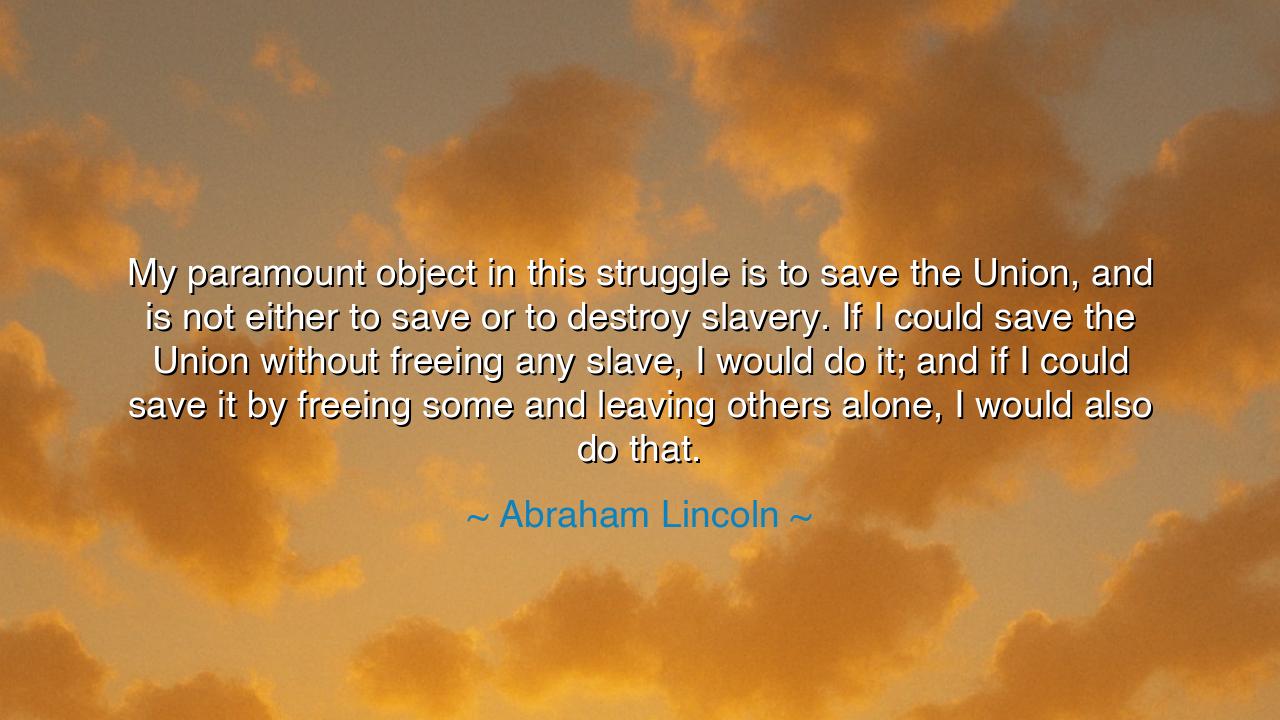
My paramount object in this struggle is to save the Union, and is
My paramount object in this struggle is to save the Union, and is not either to save or to destroy slavery. If I could save the Union without freeing any slave, I would do it; and if I could save it by freeing some and leaving others alone, I would also do that.






"My paramount object in this struggle is to save the Union, and is not either to save or to destroy slavery. If I could save the Union without freeing any slave, I would do it; and if I could save it by freeing some and leaving others alone, I would also do that." These words spoken by Abraham Lincoln resonate with a deep moral complexity that speaks to the very heart of leadership, duty, and compromise in times of crisis. In these words, Lincoln reveals the essence of his mission during the American Civil War: his primary goal was to preserve the Union, and the issue of slavery—while significant—was subordinate to the greater cause of national unity.
Lincoln's statement reflects a pragmatic approach to governance, one that acknowledges the moral weight of slavery while recognizing the overwhelming importance of maintaining the cohesion of the United States. In times of great conflict, where passions run high and ideals clash, a leader must sometimes make difficult decisions that do not align perfectly with the righteousness of one cause or another. In this, Lincoln's words speak to the ancient wisdom of the balance between ideals and realpolitik. Much like the philosophers of old, Lincoln understood that the path to true justice often requires navigating through difficult compromises—to act in service of the greater good, even if it means setting aside some aspects of moral clarity.
Consider the story of Cincinnatus, the Roman general who was called upon to save his nation from crisis. After successfully leading the Romans in battle, he relinquished his power, returning to his farm, thereby demonstrating his selflessness and devotion to the greater welfare of the state. Cincinnatus embodies the kind of leadership Lincoln sought to emulate: a leader whose personal ambition was subordinate to the good of the nation. In his own way, Lincoln too was willing to sacrifice his personal ideals for the sake of preserving the Union, understanding that the country’s survival was paramount. His words echo the ancient wisdom that sometimes, the greater good must take precedence, and in doing so, one might have to endure the tension between idealism and reality.
Yet Lincoln’s words also show a deeper moral struggle. While he did not prioritize the immediate abolition of slavery, he was not indifferent to it. He knew that the moral stain of slavery could not remain indefinitely, but he was also keenly aware of the social and political realities that would shape the course of the war and the fate of the nation. The decision to suspend the fight against slavery temporarily in order to save the Union was not a rejection of justice, but rather a tactical maneuver to ensure that the nation could ultimately achieve a greater freedom—not only for the enslaved but for all the people of the United States. In the same way, Pericles in his speeches, though advocating for democracy, sometimes had to make concessions in order to secure the survival of Athens in the face of war.
Moreover, Lincoln's statement reflects the tragic complexity of leadership during times of great national division. Much like Solon, the ancient Athenian lawgiver, who enacted reforms to preserve the city-state's stability, Lincoln’s actions were driven by the overarching need to ensure the survival of the nation. Solon’s reforms were not without controversy, but they were essential to maintaining order and peace in a time of deep social and economic unrest. Similarly, Lincoln’s willingness to balance the competing moral and political pressures during the Civil War reveals his wisdom in navigating the stormy waters of a divided nation.
The lesson of Lincoln’s words is one of leadership in adversity. In times of great crisis, a true leader must be willing to make difficult, sometimes uncomfortable choices for the greater good. Like Cincinnatus, like Solon, and like Pericles, Lincoln was willing to place the well-being of the nation above any one ideal, understanding that the preservation of the Union was the necessary foundation upon which true justice could be built.
In practical terms, we can learn from Lincoln’s example in our own lives. In moments of conflict or division, whether in personal relationships, business, or politics, we must be willing to step back and ask: What is the greater good? What is the most important goal? Sometimes, we must be willing to make difficult compromises, to set aside our own desires or ideals for the sake of a higher purpose—whether that purpose is the well-being of a family, a community, or a nation. By keeping our eyes on the greater good, we too can navigate the stormy waters of life with wisdom and integrity, knowing that, like Lincoln, our ultimate duty is to preserve the foundations upon which true justice can eventually flourish.
Thus, Lincoln’s words serve as a timeless reminder that leadership is not about achieving ideal outcomes, but about making the best decisions in the face of unavoidable compromise. Let us take from his example the courage to make the hard decisions, and the strength to hold firm to the greater vision of unity and justice, even when the road is fraught with moral complexity. In this, we will find the true meaning of leadership, as a path guided not only by principles, but by the wisdom to navigate the complexities of life.






AAdministratorAdministrator
Welcome, honored guests. Please leave a comment, we will respond soon